Gil Scott‐Heron | ||
| Allmusic Biography : One of the most important progenitors of rap music, Gil Scott-Herons aggressive, no-nonsense street poetry inspired a legion of intelligent rappers while his engaging songwriting skills placed him square in the R&B; charts later in his career, backed by increasingly contemporary production courtesy of Malcolm Cecil and Nile Rodgers (of Chic). Born in Chicago but transplanted to Tennessee for his early years, Scott-Heron spent most of his high-school years in the Bronx, where he learned firsthand many of the experiences that later made up his songwriting material. He had begun writing before reaching his teenage years, however, and completed his first volume of poetry at the age of 13. Though he attended college in Pennsylvania, he dropped out after one year to concentrate on his writing career and earned plaudits for his novel, The Vulture. Encouraged at the end of the 60s to begin recording by legendary jazz producer Bob Thiele -- who had worked with every major jazz great from Louis Armstrong to John Coltrane -- Scott-Heron released his 1970 debut, Small Talk at 125th and Lenox, inspired by a volume of poetry of the same name. With Thieles Flying Dutchman Records until the mid-70s, he signed to Arista soon after and found success on the R&B; charts. Though his jazz-based work of the early 70s was tempered by a slicker disco-inspired production, Scott-Herons message was as clear as ever on the Top 30 single "Johannesburg" and the number 15 hit "Angel Dust." Silent for almost a decade, after the release of his 1984 single "Re-Ron," the proto-rapper returned to recording in the mid-90s with a message for the gangsta rappers who had come in his wake; Scott-Herons 1994 album Spirits began with "Message to the Messengers," pointed squarely at the rappers whose influence -- positive or negative -- meant much to the children of the 1990s. In a touching bit of irony that he himself was quick to joke about, Gil Scott-Heron was born on April Fools Day 1949 in Chicago, the son of a Jamaican professional soccer player (who spent time playing for Glasgow Celtic) and a college-graduate mother who worked as a librarian. His parents divorced early in his life, and Scott-Heron was sent to live with his grandmother in Lincoln, TN. Learning musical and literary instruction from her, Scott-Heron also learned about prejudice firsthand, as he was one of three children picked to integrate an elementary school in nearby Jackson. The abuse proved too much to bear, however, and the eighth-grader was sent to New York to live with his mother, first in the Bronx and later in the Hispanic neighborhood of Chelsea. Though Scott-Herons experiences in Tennessee must have been difficult, they proved to be the seed of his writing career, as his first volume of poetry was written around that time. His education in the New York City school system also proved beneficial, introducing the youth to the work of Harlem Renaissance poet Langston Hughes as well as LeRoi Jones. After publishing a novel called The Vulture in 1968, Scott-Heron applied to Pennsylvanias Lincoln University. Though he spent less than one year there, it was enough time to meet Brian Jackson, a similarly minded musician who would later become a crucial collaborator and integral part of Scott-Herons band. Given a bit of exposure -- mostly in magazines like Essence, which called The Vulture "a strong start for a writer with important things to say" -- Scott-Heron met up with Bob Thiele and was encouraged to begin a music career, reading selections from his book of poetry Small Talk at 125th & Lennox while Thiele recorded a collective of jazz and funk musicians, including bassist Ron Carter, drummer Bernard "Pretty" Purdie, Hubert Laws on flute and alto saxophone, and percussionists Eddie Knowles and Charlie Saunders; Scott-Heron also recruited Jackson to play on the record as pianist. Most important on the album was "The Revolution Will Not Be Televised," an aggressive polemic against the major media and white Americas ignorance of increasingly deteriorating conditions in the inner cities. Scott-Herons second LP, 1971s Pieces of a Man, expanded his range, featuring songs such as the title track and "Lady Day and John Coltrane," which offered a more straight-ahead approach to song structure (if not content). The following years Free Will was his last for Flying Dutchman, however; after a dispute with the label, Scott-Heron recorded Winter in America for Strata East, then moved to Arista Records in 1975. As the first artist signed to Clive Davis new label, much was riding on Scott-Heron to deliver first-rate material with a chance at the charts. Thanks to Aristas more focused push on the charts, Scott-Herons "Johannesburg" reached number 29 on the R&B; charts in 1975. Important to Scott-Herons success on his first two albums for Arista (First Minute of a New Day and From South Africa to South Carolina) was the influence of keyboardist and collaborator Jackson, co-billed on both LPs and the de facto leader of Scott-Herons Midnight Band. Jackson left by 1978, though, leaving the musical direction of Scott-Herons career in the capable hands of producer Malcolm Cecil, a veteran producer who had midwifed the funkier direction of the Isley Brothers and Stevie Wonder earlier in the decade. The first single recorded with Cecil, "The Bottle," became Scott-Herons biggest hit yet, peaking at number 15 on the R&B; charts, though he still made no waves on the pop charts. Producer Nile Rodgers of Chic also helped on production during the 1980s, when Scott-Herons political attack grew even more fervent with a new target, President Ronald Reagan. (Several singles, including the R&B; hits "B Movie" and "Re-Ron," were specifically directed at the Presidents conservative policies.) By 1985, however, Scott-Heron was dropped by Arista, just after the release of The Best of Gil Scott-Heron. Though he continued to tour around the world, Scott-Heron chose to discontinue recording. He did return, however, in 1993 with a contract for TVT Records and the album Spirits. For well over a decade, Scott-Heron was mostly inactive, held back by a series of drug possession charges. He began performing semi-regularly in 2007, and one year later, announced that he was HIV-positive. He recorded an album, Im New Here, released on XL in 2010. In February of 2011, Scott-Heron and Jamie xx (Jamie Smith of xx) issued a remixed version of the album, entitled Were New Here, also issued on XL. Later that year, Scott-Heron died in a New York hospital, just after returning from a set of live dates in Europe. | ||
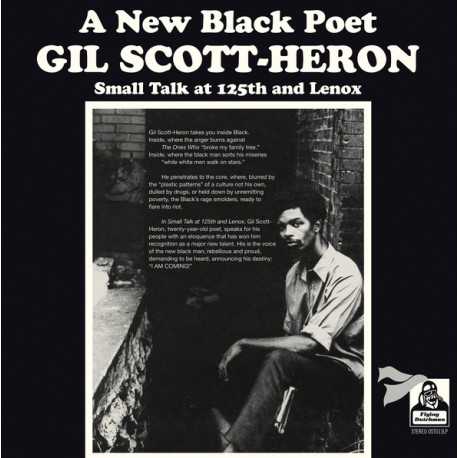 | Album: 1 of 30 Title: Small Talk at 125th and Lenox Released: 1970 Tracks: 14 Duration: 44:03 Scroll: Up Down Top Bottom 25% 50% 75% Spotify Allmusic Wikipedia AlbumCover | 1 Introduction / The Revolution Will Not Be Televised (03:21) 2 Omen (01:46) 3 Brother (02:35) 4 Comment #1 (04:27) 5 Small Talk at 125th & Lenox (01:21) 6 The Subject Was Faggots (03:11) 7 Evolution (And Flashback) (03:21) 8 Plastic Pattern People (02:53) 9 Whitey on the Moon (01:59) 10 The Vulture (04:32) 11 Enough (04:14) 12 Paint It Black (00:33) 13 Wholl Pay Reparations on My Soul? (05:15) 14 Everyday (04:30) |
| Small Talk at 125th and Lenox : Allmusic album Review : Disregard the understated title; Small Talk at 125th and Lenox was a volcanic upheaval of intellectualism and social critique, recorded live in a New York nightclub with only bongos and conga to back the street poet. Here Scott-Heron introduced some of his most biting material, including the landmark "The Revolution Will Not Be Televised" as well as his single most polemical moment: the angry race warning "Enough." Still, he balances the tone and mood well, ranging from direct broadsides to clever satire. He introduces "Whitey on the Moon" with a bemused air ("wanting to give credit where credit is due"), then launches into a diatribe concerning living conditions for the neglected on earth while those racing to the moon receive millions of taxpayer dollars. On "Evolution (And Flashback)," Scott-Heron laments the setbacks of the civil rights movement and provides a capsule history of his race, ending sharply with these words: "In 1960, I was a negro, and then Malcolm came along/Yes, but some nigger shot Malcolm down, though the bitter truth lives on/Well, now I am a black man, and though I still go second class/Whereas once I wanted the white mans love, now he can kiss my ass." The only sour note comes on a brush with homophobia, "The Subject Was Faggots." | ||
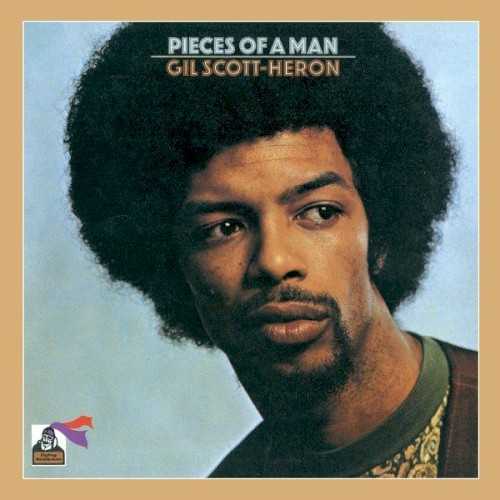 | Album: 2 of 30 Title: Pieces of a Man Released: 1971 Tracks: 14 Duration: 1:00:51 Scroll: Up Down Top Bottom 25% 50% 75% Spotify Allmusic Wikipedia AlbumCover | 1 The Revolution Will Not Be Televised (03:06) 2 Save the Children (04:27) 3 Lady Day and John Coltrane (03:37) 4 Home Is Where the Hatred Is (03:21) 5 When You Are Who You Are (03:23) 6 I Think I’ll Call It Morning (03:31) 7 Pieces of a Man (04:54) 8 A Sign of the Ages (04:03) 9 Or Down You Fall (03:13) 10 The Needle’s Eye (04:51) 11 The Prisoner (09:25) 12 Chains (03:23) 13 Peace (06:07) 14 A Toast to the People (03:26) |
| Pieces of a Man : Allmusic album Review : Gil Scott-Herons 1971 album Pieces of a Man set a standard for vocal artistry and political awareness that few musicians will ever match. His unique proto-rap vocal style influenced a generation of hip-hop artists, and nowhere is his style more powerful than on the classic "The Revolution Will Not Be Televised." Even though the media -- the very entity attacked in this song -- has used, reused, and recontextualized the song and its title so many times, the message is so strong that it has become almost impossible to co-opt. Musically, the track created a formula that modern hip-hop would follow for years to come: bare-bones arrangements featuring pounding basslines and stripped-down drumbeats. Although the song features plenty of outdated references to everything from Spiro Agnew and Jim Webb to The Beverly Hillbillies, the force of Scott-Herons well-directed anger makes the song timeless. More than just a spoken word poet, Scott-Heron was also a uniquely gifted vocalist. On tracks like the reflective "I Think Ill Call It Morning" and the title track, Scott-Herons voice is complemented perfectly by the soulful keyboards of Brian Jackson. On "Lady Day and John Coltrane," he not only celebrates jazz legends of the past in his words but in his vocal performance, one that is filled with enough soul and innovation to make Coltrane and Billie Holiday nod their heads in approval. More than three decades after its release, Pieces of a Man is just as -- if not more -- powerful and influential today as it was the day it was released. | ||
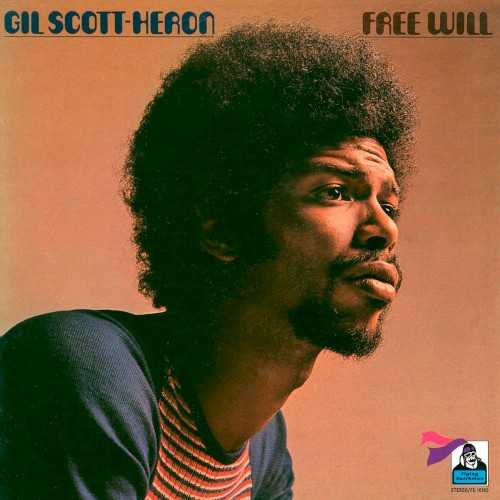 | Album: 3 of 30 Title: Free Will Released: 1972 Tracks: 20 Duration: 1:00:41 Scroll: Up Down Top Bottom 25% 50% 75% Spotify Allmusic AlbumCover | 1 Free Will (03:42) 2 The Middle of Your Day (04:32) 3 The Get Out of the Ghetto Blues (05:11) 4 Speed Kills (03:18) 5 Did You Hear What They Said? (03:31) 6 The King Alfred Plan (02:47) 7 No Knock (02:12) 8 Wiggy (01:37) 9 Aint No New Thing (04:33) 10 Billy Green Is Dead (02:15) 11 Sex Education: Ghetto Style (00:51) 12 And Then He Wrote Meditations (03:33) 13 Free Will (alternate take) (03:02) 14 Speed Kills (alternate take) (03:25) 15 The King Alfred Plan (alternate take) (03:01) 16 No Knock (alternate take) (02:04) 17 Wiggy (alternate take) (01:35) 18 Aint No New Thing (alternate take) (03:34) 19 Billy Green Is Dead (alternate take) (02:57) 20 Free Will (alternate take 2) (02:53) |
| Free Will : Allmusic album Review : Gil Scott-Herons third album is split down the middle, the first side being a purely musical experience with a full band (including flutist Hubert Laws and drummer Pretty Purdie), the second functioning more as a live rap session with collaborator Brian Jackson on flute and a few friends on percussion. For side one, although hes overly tentative on the ballad "The Middle of Your Day," Scott-Heron excels on the title track and the third song, "The Get Out of the Ghetto Blues," one of his best, best-known performances. The second side is more of an impromptu performance, with Scott-Heron often explaining his tracks by way of introduction ("No Knock" referred to a new police policy whereby knocking was no longer required before entering a house, "And Then He Wrote Meditations" being Scott-Herons tribute to John Coltrane). His first exploration of pure music-making, Free Will functions as one of Scott-Herons most visceral performance, displaying a maturing artist who still draws on the raw feeling of his youth. The Bluebird reissue from 2001 includes eight alternate takes, best being an alternate of the title track. | ||
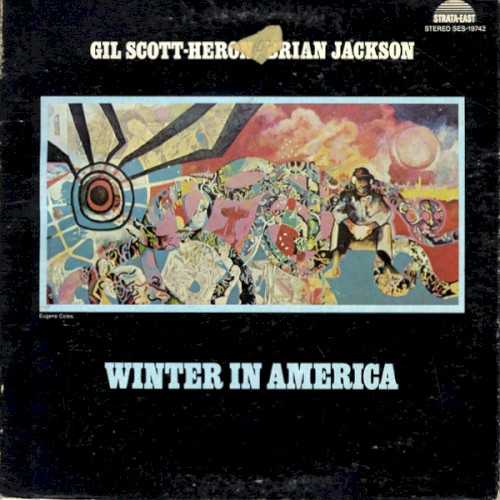 | Album: 4 of 30 Title: Winter in America Released: 1974 Tracks: 9 Duration: 44:57 Scroll: Up Down Top Bottom 25% 50% 75% Wikipedia Allmusic AlbumCover | 1 Peace Go With You, Brother (As-Salaam-Alaikum) (05:33) 2 Rivers of My Fathers (08:33) 3 A Very Precious Time (05:18) 4 Back Home (02:52) 5 The Bottle (05:16) 6 Song for Bobby Smith (04:45) 7 Your Daddy Loves You (02:59) 8 H₂Ogate Blues (08:27) 9 Peace Go With You, Brother (Wa-Alaikum-Salaam) (01:11) |
| Winter in America : Allmusic album Review : Gil Scott-Heron was at his most righteous and provocative on this album. The title cut was a moving, angry summation of the social injustices Scott-Heron felt had led the nation to a particularly dangerous period, while "The Bottle" was a great treatise on the dangers of alcohol abuse. He also offered his thoughts on Nixons legacy with "The H2O Gate Blues," a classic oral narrative. Brian Jacksons capable keyboard, acoustic piano and arranging talents helped make this a first-rate release, one of several the duo issued during the 1970s. | ||
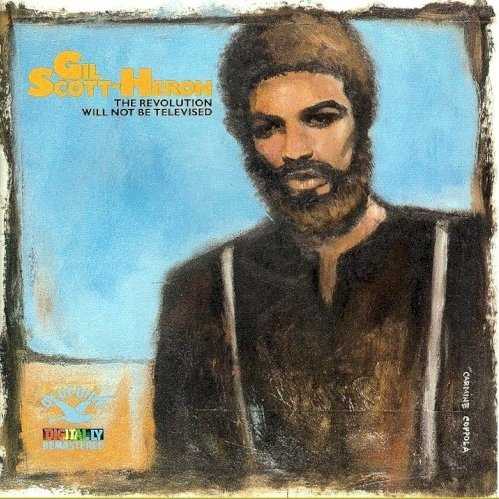 | Album: 5 of 30 Title: The Revolution Will Not Be Televised Released: 1974 Tracks: 17 Duration: 1:02:08 Scroll: Up Down Top Bottom 25% 50% 75% Spotify Allmusic Wikipedia AlbumCover | 1 The Revolution Will Not Be Televised (03:06) 2 Sex Education: Ghetto Style (00:52) 3 The Get Out of the Ghetto Blues (05:08) 4 No Knock (01:30) 5 Lady Day and John Coltrane (03:34) 6 Pieces of a Man (04:56) 7 Home Is Where the Hatred Is (03:21) 8 Brother (01:45) 9 Save the Children (04:27) 10 Whitey on the Moon (01:28) 11 Did You Hear What They Said? (03:28) 12 When You Are Who You Are (03:23) 13 I Think I’ll Call It Morning (03:31) 14 A Sign of the Ages (04:03) 15 Or Down You Fall (03:13) 16 The Needle’s Eye (04:51) 17 The Prisoner (09:25) |
| The Revolution Will Not Be Televised : Allmusic album Review : Spanning 1970-1972, this superb collection takes us back to Gil Scott-Herons early years, when he was working with jazz producer Bob Thiele -- a man who had been in the studio with everyone from John Coltrane and Pharoah Sanders to Coleman Hawkins. But The Revolution Will Not Be Televised isnt a jazz collection per se; its a collection of innovative R&B; and spoken poetry that contains jazz influences and finds Scott-Heron employing such jazz musicians as flutist Hubert Laws and bassist Ron Carter. Like the Last Poets, Scott-Heron has been described as "one of the first rappers" -- and while he was hardly the first person to speak in rhyme to music, there are definitely parallels between angry sociopolitical poems like "Whitey on the Moon," "No Knock," and "Brother" and hip-hop commentary from the 1980s. Poetry, however, doesnt dominate this album -- most of the selections illustrate Scott-Herons excellence as a singer, including "Home Is Where the Hatred Is," "Did You Hear What They Said?," and the poignant "Save the Children." One of the collections less political tracks is "Lady Day and John Coltrane," an R&B; classic that articulates how easily jazz can lift a persons spirits. The Revolution Will Not Be Televised isnt the last word on Scott-Herons artistry -- he recorded many more treasures after leaving Flying Dutchman for Arista in 1975. But its one of the collections to acquire if youre exploring his artistry for the first time. | ||
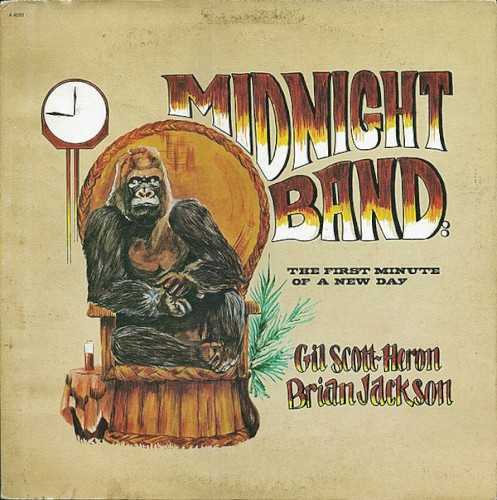 | Album: 6 of 30 Title: Midnight Band: The First Minute of a New Day Released: 1975 Tracks: 11 Duration: 1:04:55 Scroll: Up Down Top Bottom 25% 50% 75% Spotify AlbumCover | 1 Offering (03:34) 2 The Liberation Song (Red, Black and Green) (06:15) 3 Must Be Something (05:15) 4 Aint No Such Thing as Superman (04:11) 5 Pardon Our Analysis (We Beg Your Pardon) (08:01) 6 Guerilla (07:49) 7 Winter in America (06:05) 8 Western Sunrise (01:38) 9 Alluswe (05:00) 10 A Talk: Bluesology / Black History / Jaws / The Revolution Will Not Be Televised (10:41) 11 Winter in America (solo version) (06:26) |
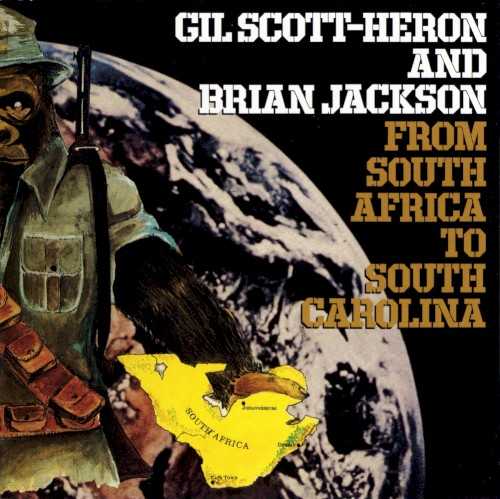 | Album: 7 of 30 Title: From South Africa to South Carolina Released: 1975 Tracks: 8 Duration: 42:43 Scroll: Up Down Top Bottom 25% 50% 75% Spotify Wikipedia Allmusic AlbumCover | 1 Johannesburg (04:47) 2 A Toast to the People (05:47) 3 The Summer of 42 (04:41) 4 Beginnings (First Minute of a New Day) (05:36) 5 South Carolina (Barnwell) (04:33) 6 Essex (09:17) 7 Fell Together (04:30) 8 A Lovely Day (03:29) |
| From South Africa to South Carolina : Allmusic album Review : The collaboration between Gil Scott-Heron and Brian Jackson was now a formal one, as they were issuing albums as a team. This was their second duo project to make the pop charts, and it included anti-nuclear and anti-apartheid themes, plus less political, more autobiographical/reflective material like "Summer of 42," "Beginnings (The First Minute of a New Day)," and "Fell Together." Scott-Heron was now a campus and movement hero, and Jacksons production and arranging savvy helped make his albums as arresting musically as they were lyrically. | ||
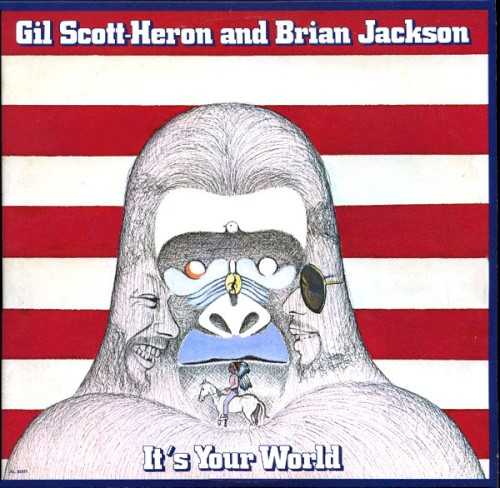 | Album: 8 of 30 Title: Its Your World Released: 1976 Tracks: 10 Duration: 1:13:27 Scroll: Up Down Top Bottom 25% 50% 75% Allmusic AlbumCover | 1 Its Your World (03:55) 2 Possum Slim (06:00) 3 New York City (04:45) 4 17th Street (05:40) 5 Tomorrows Trane (07:34) 6 Must Be Something (05:20) 7 Home Is Where the Hatred Is (12:08) 8 Bicentennial Blues (08:40) 9 The Bottle (live) (13:30) 10 Sharing (05:55) |
| It's Your World : Allmusic album Review : This Gil Scott-Heron double album, roughly two thirds of which was recorded live in Boston on July 2-4, 1976, makes the most of its Centennial-centric time frame. Between the American flag striped cover art and Herons spoken word spiel on an 8-and-a-half minute poem/rant "Bicentennial Blues," the album loses little of its impact, regardless of how the years have mildewed once fresh political topics like Nixon, Agnew, and Watergate. Four of its songs are studio recordings ("Its Your World," "Possum Slim," "New York City," and "Sharing"), and even though theyre up to Herons usual jazz/blues/pop standards, the disc is most effective on the concert tracks. As he explains in the 2000 penned liner notes, The Midnight Band was a compelling live unit and one listen to the brisk, electrifying, 13-minute rendition of "The Bottle," one of Herons most penetrating tracks, is all youll need to understand why. More importantly, like the best protest music, these tunes have lost none of their lyrical edge or incisiveness throughout the years. Musically the band is taut and rehearsed down to the finest time change, yet loose enough to open up on the jams. The heavy Latin percussion/flute/piano -- but remarkably guitar-less -- sound is equal parts Santana and Mongo Santamaria with a strong jazz current throughout, especially on the John Coltrane tribute "Trane," featuring tenor hornman Bilal Sunni-Alis fiery lead. Scott-Herons deep, mellifluous voice is alternately soothing and cutting, infusing the music with heart and soul, while keeping the sound focused even during the longer improvisations. Only a dated 70s drum solo belies the year this was recorded. Chestnuts like "Home Is Where the Hatred Is" explode in extended live versions that become definitive readings of the tunes. Remastered for its reissue, Its Your World crackles with energy, presenting an accomplished band at their peak and placing the listener practically on stage for the live tracks with acoustics that are full, yet airy and spacious. One of Gil Scott-Herons best albums as well as a compelling musical time capsule, the disc is proof of the artists musical and lyrical acuity and is a moving listening experience. | ||
 | Album: 9 of 30 Title: Bridges Released: 1977-12 Tracks: 9 Duration: 39:32 Scroll: Up Down Top Bottom 25% 50% 75% Allmusic AlbumCover | 1 Hello Sunday! Hello Road! (03:37) 2 Song of the Wind (03:59) 3 Racetrack in France (04:16) 4 Vildgolia (Deaf, Dumb and Blind) (07:43) 5 Under the Hammer (04:03) 6 We Almost Lost Detroit (05:18) 7 Tuskeegee #626 (00:34) 8 Delta Man (Where Im Comin From) (05:36) 9 95 South (All of the Places Weve Been) (04:21) |
| Bridges : Allmusic album Review : Gil Scott-Heron, Brian Jackson, and the Midnight Band take a slightly different approach with their 1977 effort, Bridges. With less of the gaping and world-infused sound prevalent on previous albums, the songs are more concise and Scott-Heron comes into his own as a singer depending less on his spoken word vocal style. The excellent songwriting exposes Scott-Heron at the height of his powers as a literary artist. The social, political, cultural, and historical themes are presented in a tight funk meets jazz meets blues meets rock sound that is buoyed by Jacksons characteristic keyboard playing and the Midnight Bands colorful arrangements. Scott-Herons ability to make the personal universal is evident from the opening track, "Hello Sunday! Hello Road!," all the way through to the gorgeous "95 South (All of the Places Weve Been)." The most popular cut on the album, "We Almost Lost Detroit," which shares its title with the John G. Fuller book published in 1975, recounts the story of the nuclear meltdown at the Fermi Atomic Power Plant near Monroe, MI, in 1966. This song was also contributed to the No Nukes concert and album in 1980. Along with the two records that would follow in the late 70s, Bridges stands as one of Scott-Herons most enjoyable and durable albums. | ||
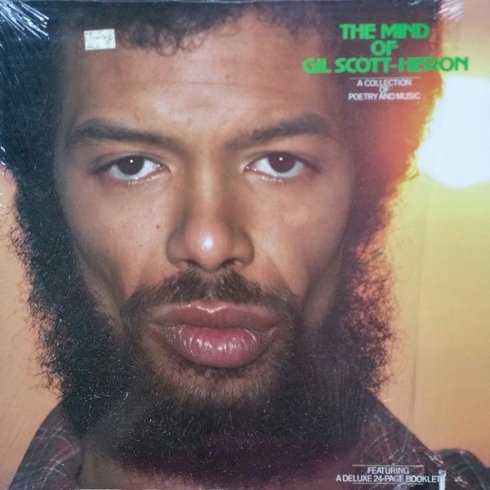 | Album: 10 of 30 Title: The Mind of Gil Scott Heron Released: 1978 Tracks: 7 Duration: 50:43 Scroll: Up Down Top Bottom 25% 50% 75% Allmusic Wikipedia AlbumCover | 1 H20 Gate Blues (07:58) 2 We Beg Your Pardon (Pardon Our Analysis) (07:52) 3 The New Deal (03:10) 4 Jose Campos Torres (02:36) 5 The Ghetto Call (Dot Dot Dit Dot Dit Dot Dot Dash) (12:57) 6 Bicentennial Blues (08:39) 7 Space Shuttle (07:28) |
| The Mind of Gil Scott Heron : Allmusic album Review : This compilation of primarily spoken word poetry is a showcase for Scott-Herons mastery of rhythm and showmanship. However, too many of the poems are dated political rants that, while occasionally biting and amusing, dont hold up to the passage of time. | ||
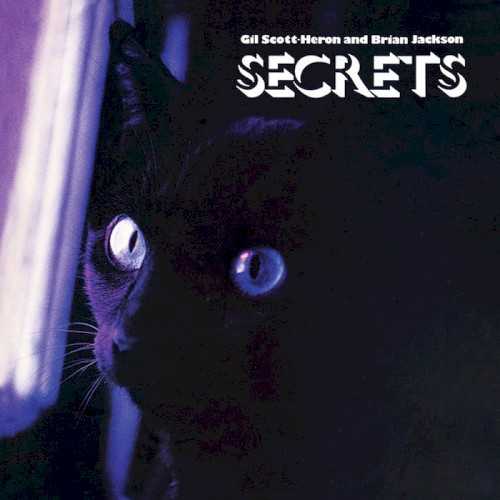 | Album: 11 of 30 Title: Secrets Released: 1978 Tracks: 9 Duration: 38:07 Scroll: Up Down Top Bottom 25% 50% 75% Allmusic AlbumCover | 1 Angel Dust (04:16) 2 Madison Avenue (03:09) 3 Cane (03:34) 4 Third World Revolution (04:26) 5 Better Days Ahead (03:30) 6 Three Miles Down (04:19) 7 Angola Louisiana (05:34) 8 Show Bizness (02:50) 9 A Prayer for Everybody / To Be Free (06:27) |
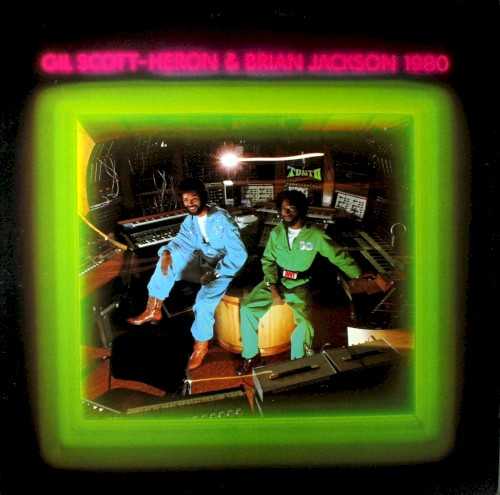 | Album: 12 of 30 Title: 1980 Released: 1980 Tracks: 8 Duration: 35:47 Scroll: Up Down Top Bottom 25% 50% 75% Allmusic AlbumCover | 1 Late Last Night (05:13) 2 Shah Mot (The Shah Is Dead/Checkmate) (03:28) 3 Push Comes to Shove (04:04) 4 Corners (04:49) 5 1980 (06:00) 6 Shut Um Down (03:37) 7 Willing (04:07) 8 Alien (Hold on to Your Dream) (04:25) |
| 1980 : Allmusic album Review : 1980 can be viewed as a precursor for the venomous rants Gil Scott-Heron would unleash on the eventual Reagan-led White House. Loaded with perceptive and poignant observations on the state of America as it advanced into a new and uncertain decade, 1980 is a powerful final album of 70s for Scott-Heron and his partner Brian Jackson. Amazingly, Scott-Herons focus at the close of the decade is strikingly similar to his focus on his 1970 debut, Small Talk at 125th and Lennox; namely that social and political change has yet to come to many Americans, despite the advancements in technology and other seemingly less significant realms. The enemies are the same: nuclear power and big business ("Shut Um Down"), oppressive governments ("Shah Mot"), and racism ("Willing"). On the title track, Scott-Herons gaze is set on the future with an eye on the past as well. When he sings, "Boogie-Woogies somewhere in the lost and found," hes not only speaking of the changes in music, but also in popular culture. There is a hint of resentment on his part that this musical style, like other revolutionary African-American innovations, has been progressively stolen, mined, sterilized, and eventually discarded. This is not to say that the music throughout the album is marked by regret or sorrow. The spacy synthesizers, background vocals, and use of horns, along with Jacksons always-extraordinary arrangements, give the album a quality that matches the aura of the period without forgetting past musical styles. The descriptive "Alien (Hold on to Your Dreams)" is the albums most enduring song, vividly portraying the plight of Mexican illegal aliens living in Los Angeles and offering an uplifting refrain. | ||
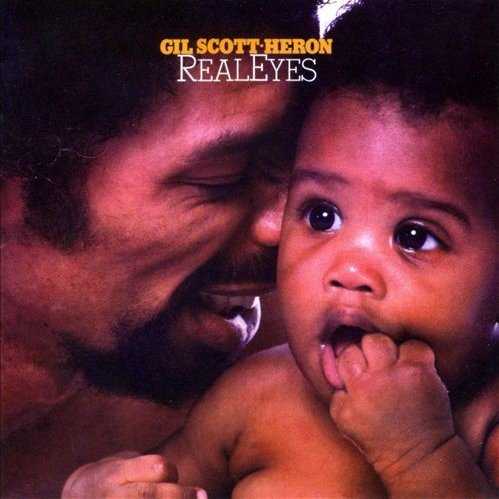 | Album: 13 of 30 Title: Real Eyes Released: 1980 Tracks: 8 Duration: 35:22 Scroll: Up Down Top Bottom 25% 50% 75% Spotify Allmusic AlbumCover | 1 The Train From Washington (04:47) 2 Not Needed (03:56) 3 Waiting for the Axe to Fall (04:48) 4 Combinations (03:40) 5 A Legend in His Own Mind (03:41) 6 You Could Be My Brother (06:22) 7 The Klan (04:49) 8 Your Daddy Loves You (For Gia Louise) (03:16) |
| Real Eyes : Allmusic album Review : In 1980, Gil Scott-Heron had a nice opportunity to promote his Real Eyes album when he became the opening act on Stevie Wonders Hotter Than July tour. On his own, Scott-Heron usually played small clubs, but opening for Wonder gave him the chance to perform in front of thousands of Wonder fans in major stadiums and sports arenas. Many of Wonders white fans seemed to be unfamiliar with Scott-Heron (who had never had a major pop hit), while a lot of Wonders black fans at least knew him for "The Bottle" and "Angel Dust" even if they hadnt bought a lot of his albums. Opening for all those Wonder fans certainly didnt hurt Scott-Herons career, but it didnt make him a superstar either. While its possible that some Wonder fans enjoyed Scott-Herons opening sets enough to go out and purchase Real Eyes, most of the people who acquired this LP were already confirmed Scott-Heron fans. Unfortunately, Real Eyes lacked a hit single, although the material is excellent nonetheless. As usual, Scott-Heron has a lot of sociopolitical things on his mind -- "The Train From Washington" concludes that the working class cant depend on the U.S. government for anything, while "Not Needed" angrily points the finger at companies who consider longtime employees expendable. And the albums less sociopolitical songs are equally memorable. "Your Daddy Loves You" is a touching ode to Scott-Herons daughter Gia Louise (who was only a child in 1980), and the jazz-oriented "A Legend in His Own Mind" is a humorous, clever put-down of a wannabe "Casanova" who isnt nearly the ladies man he brags about being. Scott-Herons love of jazz serves him well on "A Legend in His Own Mind" and the smoky "Combinations," but make no mistake: Real Eyes is an R&B album more than anything. | ||
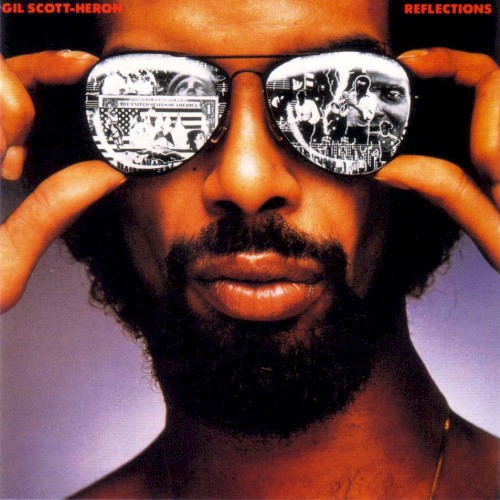 | Album: 14 of 30 Title: Reflections Released: 1981 Tracks: 7 Duration: 40:50 Scroll: Up Down Top Bottom 25% 50% 75% Spotify Allmusic AlbumCover | 1 Storm Music (04:54) 2 Grandmas Hands (05:24) 3 Is That Jazz? (03:46) 4 Morning Thoughts (04:41) 5 Inner City Blues (Poem: The Siege of New Orleans) (05:50) 6 Gun (04:02) 7 B Movie (12:12) |
| Reflections : Allmusic album Review : Although a major across-the-board hit always eluded the poet, singer, and activist Gil Scott-Heron, this album does contain one of his best-known songs. "B-Movie," an extended attack on Ronald "Ray-gun," unleashes 12 minutes of vitriol about the then recently elected president. Beginning with the declaration "Mandate, my ass," its a laundry list of fears about Reagan, fantasizing that his election meant "were all actors" in some surreal film. Delivered over a taut funk groove, parts of it are still funny. Elsewhere, Scott-Heron takes an early stab at endorsing firearm control on "Gun"; slows things down for "Morning Thoughts"; and explores reggaes rhythms and revolutionary power on "Storm Music," a direction hed pursue more fully on his next album, Moving Target. The disc also includes a pair of covers that offer varying degrees of success: Bill Withers "Grandmas Hands" is a natural for Scott-Herons warm baritone and a bright soul-jazz arrangement from the Midnight Band, but the version of Marvin Gayes "Inner City Blues," while it swings convincingly, has a lengthy spoken-word riff that fails to embellish on the pain implicit in the original. Overall, Reflections doesnt capture Scott-Heron at the peak of his game, though anyone who enjoyed the other works from his Arista period certainly wont be disappointed. | ||
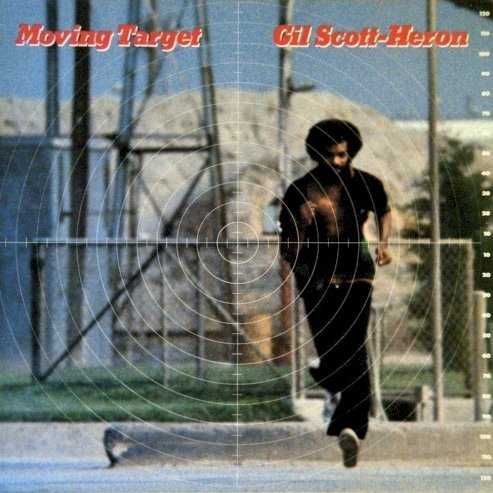 | Album: 15 of 30 Title: Moving Target Released: 1982 Tracks: 7 Duration: 37:32 Scroll: Up Down Top Bottom 25% 50% 75% Spotify Allmusic AlbumCover | 1 Fast Lane (04:54) 2 Washington, D.C. (04:20) 3 No Exit (04:05) 4 Blue Collar (05:45) 5 Explanations (04:12) 6 Ready or Not (04:33) 7 Black History / The World (09:41) |
| Moving Target : Allmusic album Review : Gil Scott-Herons last proper album for more than a decade, Moving Target was recorded after a period of intense touring (hence the title) and, perhaps understandably, finds the Midnight Band playing a larger role than usual. It also may reflect the groups travels, as the typical, tastefully jazzy R&B and funk grooves -- like set-opener "Fast Lane" and "Explanations" -- are supplemented with more exotic sounds. Like Stevie Wonder, for whom he and the Midnight Band opened a tour in 1980, Scott-Heron and his bandmates were experimenting with reggae. "No Exit" has clear echoes of Bob Marley, while "Ready or Not" is a sultry island jam. Both tunes also had themes more personal than political, a shift noticeable elsewhere on the album (even "Washington D.C.," with its seemingly obvious subject, is as much about the resilient spirit of D.C.s citizens as its about the citys politicians). Thats somewhat surprising, given that Scott-Heron had recently enjoyed success with "B-Movie," a pointed attack on then-president Ronald Reagan. But "Blue Collar" is a populist manifesto that gives shout-outs to working folks in a variety of professions across the fruited plain before concluding with the dispirited chorus, "There aint no place we aint been down," and "Black History/The World" offers nearly ten minutes of Afro-centric theorizing, beginning with a spoken introduction that hearkens back to Scott-Herons sarcastic, poetic beginnings and ends with a simple -- some would say simplistic -- plea for peace and world change. | ||
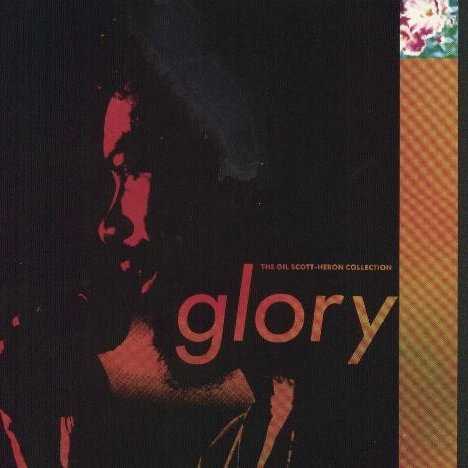 | Album: 16 of 30 Title: Glory: The Gil Scott-Heron Collection Released: 1990 Tracks: 26 Duration: 2:08:06 Scroll: Up Down Top Bottom 25% 50% 75% AlbumCover | 1 Johannesburg (04:44) 2 The Revolution Will Not Be Televised (03:06) 3 Blue Collar (05:44) 4 New York City (04:46) 5 Hello Sunday! Hello Road! (03:37) 6 We Almost Lost Detroit (05:18) 7 Angel Dust (04:16) 8 The Bottle (04:53) 9 Winter in America (06:07) 10 Delta Man (Where Im Comin From) (05:36) 11 South Carolina (Barnwell) (03:43) 12 Inner City Blues (Make Me Wanna Holler) (05:50) 13 Show Bizness (02:50) 1 B Movie (12:07) 2 Lady Day & John Coltrane (03:34) 3 I Think I Call It Morning (04:06) 4 You Can Depend On (The Train From Washington) (04:47) 5 Shut’em Down (05:10) 6 Ain’t No Such Thing as a Superman (04:05) 7 The Klan (04:52) 8 Fast Lane (04:57) 9 Race Track in France (04:18) 10 Storm Music (04:54) 11 Save the Children (04:29) 12 Beginnings (The First Minute of a New Day) (06:25) 13 Legend of His Own Mind (03:42) |
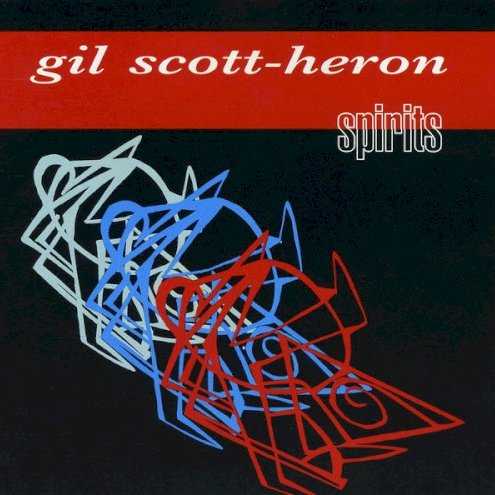 | Album: 17 of 30 Title: Spirits Released: 1994 Tracks: 10 Duration: 56:32 Scroll: Up Down Top Bottom 25% 50% 75% Spotify Allmusic AlbumCover | 1 Message to the Messengers (04:57) 2 Spirits (07:48) 3 Give Her a Call (05:44) 4 Ladys Song (03:14) 5 Spirits Past (03:01) 6 The Other Side, Part I (05:25) 7 The Other Side, Part II (06:10) 8 The Other Side, Part III (06:39) 9 Work for Peace (07:33) 10 Dont Give Up (05:57) |
| Spirits : Allmusic album Review : With Spirits, Gil Scott-Heron made a triumphant return to the studio after a 12-year absence. Though the politically charged R&B; singers voice had deteriorated, much of his soulfulness comes through. His songwriting is consistently excellent, and songs ranging from "Message to the Messengers" (which advises young rap artists to use their power wisely) to "Work for Peace" leave no doubt that his sociopolitical observations are as sharp as ever. One of the most riveting cuts is "The Other Side," an extended remake of his early-70s classic "Home Is Where the Hatred Is" (which describes a drug addicts struggle). The East Coaster had been battling addiction himself during his absence from recording, and this heartfelt song isnt for the squeamish. Scott-Heron had successfully dabbled in jazz over the years, and in fact, among the CDs many strong points are the lyrics he adds to John Coltranes "Spirits." One cannot help but wish Scott-Heron still had a great voice to go with this material, but even so, Spirits is powerful listening. | ||
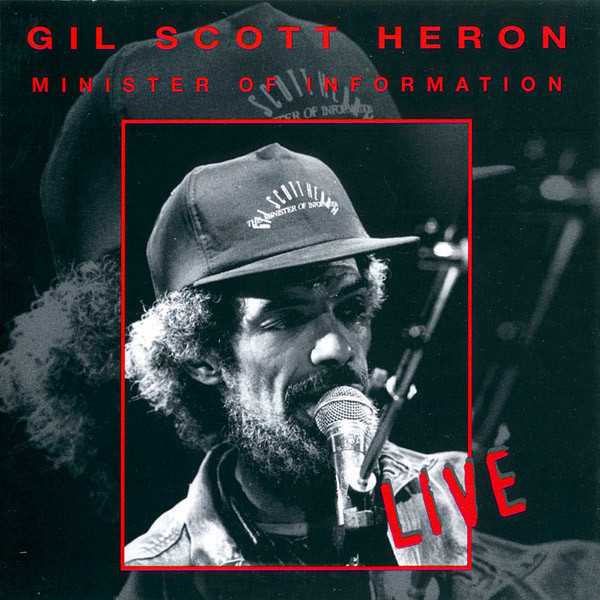 | Album: 18 of 30 Title: Minister of Information Released: 1994-09-28 Tracks: 7 Duration: 1:01:25 Scroll: Up Down Top Bottom 25% 50% 75% AlbumCover | 1 Washington D.C. (06:22) 2 Save the Children (11:19) 3 Gun (04:08) 4 Blue Collar (10:30) 5 Alien (Hold on to Your Dreams) (06:30) 6 Winter in America (07:47) 7 The Bottle (14:49) |
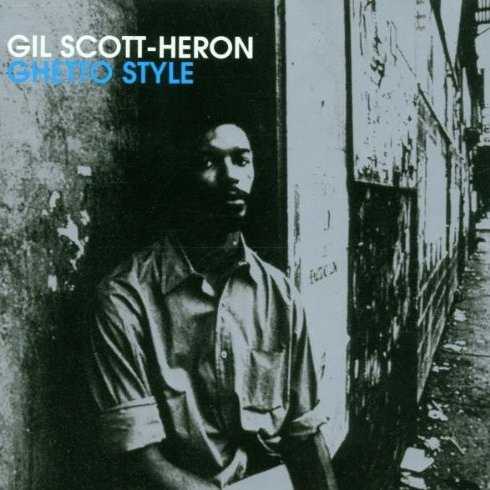 | Album: 19 of 30 Title: Ghetto Style Released: 1998 Tracks: 21 Duration: 1:09:48 Scroll: Up Down Top Bottom 25% 50% 75% Allmusic AlbumCover | 1 The Revolution Will Not Be Televised (03:06) 2 Or Down You Fall (03:13) 3 The Needle’s Eye (04:51) 4 I Think I’ll Call It Morning (03:31) 5 When You Are Who You Are (03:23) 6 Save the Children (04:27) 7 Did You Hear What They Said? (03:28) 8 Free Will (03:31) 9 Speed Kills (03:18) 10 Middle of Your Day (04:30) 11 Pieces of a Man (04:51) 12 A Sign of the Times (04:03) 13 The Get Out of the Ghetto Blues (05:08) 14 Lady Day & John Coltrane (03:34) 15 Home Is Where the Hatred Is (03:21) 16 No Knock (01:30) 17 The Revolution Will Not Be Televised (Early version) (03:23) 18 Sex Education: Ghetto Style (00:52) 19 Small Talk at 125th & Lenox (01:21) 20 King Alfred Plan (02:49) 21 Billy Green Is Dead (01:30) |
| Ghetto Style : Allmusic album Review : This compilation features 21 tracks from Gil Scott-Herons first three long-players -- Small Talk at 125th and Lenox (1970), Pieces of a Man (1971), and Free Will (1972) -- all for producer Bob Thieles Flying Dutchman label. Although Scott-Herons seminal recordings consisted of his radical street poetry set to a bombast of conga accompaniment, he honed his prose into socially conscious R&B.; This would heavily influence rap music nearly a decade prior to its fruition in the early 80s and 1990s. The original recitation version of "The Revolution Will Not Be Televised" -- which comes off as militant as the more familiar instrumentally accompanied reading -- as well as the slice-of-life commentary title track "Small Talk at 125th and Lenox" appropriately represent Scott-Herons first disc with an edgy political incorrectness taken directly from the soul of the American ghettos. Although the tone of his later work would become somewhat melodically tempered, the lyrical content remained in-your-face and wholly uncompromising. On the follow-up, Pieces of a Man, the artist is accompanied by a bevy of studio musicians and jazz heavies, including Ron Carter (bass), Hubert Laws (flute/saxophone), as well as Bernard "Pretty" Purdie (drums). This would also begin Scott-Herons dramatic and fruitful collaborative relationship with Brian Jackson (keyboards), which would spawn several landmark and otherwise socially conscious discs, including the apropos bicentennial release Its Your World (1976). Jacksons delicate interplay on "Did You Hear What They Said" and "Or Down You Fall" demonstrates the musical cohesion that would continue to develop between the two. Although this is a European import, as no domestic compilation of this material exists, Ghetto Style (1998) is a highly recommended primer. | ||
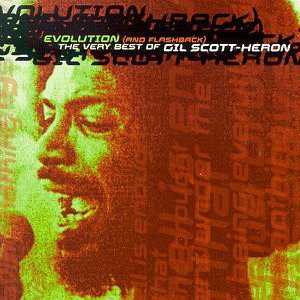 | Album: 20 of 30 Title: Evolution (And Flashback) Released: 1999-02-09 Tracks: 15 Duration: 46:44 Scroll: Up Down Top Bottom 25% 50% 75% AlbumCover | 1 Paint It Black (00:33) 2 Evolution (And Flashback) (03:04) 3 Free Will (03:31) 4 Whitey on the Moon (01:47) 5 The Vulture (04:18) 6 Small Talk at 125th and Lenox (01:22) 7 Billy Green Is Dead (01:30) 8 Aint No New Thing (04:33) 9 The Get Out of the Ghetto Blues (05:08) 10 The King Alfred Plan (02:47) 11 No Knock (02:12) 12 Enough (04:14) 13 Wholl Pay Reparations on My Soul? (05:15) 14 Home Is Where the Hatred Is (03:21) 15 The Revolution Will Not Be Televised (03:06) |
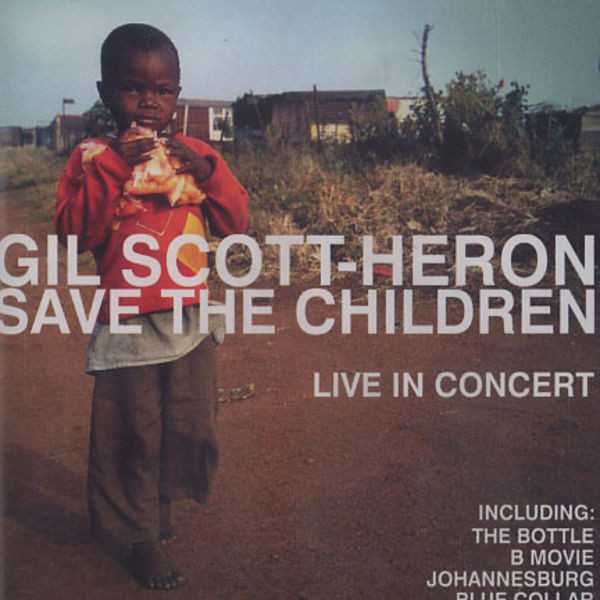 | Album: 21 of 30 Title: Save the Children: Live in Concert Released: 2004-07-19 Tracks: 12 Duration: 1:14:07 Scroll: Up Down Top Bottom 25% 50% 75% AlbumCover | 1 Is That Jazz? (04:18) 2 Gun (03:31) 3 Save the Children (08:03) 4 The Bottle (08:59) 5 Winter in America (07:35) 6 Blue Collar (07:25) 1 Johannesburg (03:57) 2 Three Miles Down (06:13) 3 Washington D.C. (05:11) 4 Shut em Down (05:51) 5 Alien (Hold on to Your Dream) (08:01) 6 B Movie (04:57) |
 | Album: 22 of 30 Title: Anthology: Messages Released: 2005-06-18 Tracks: 15 Duration: 1:15:14 Scroll: Up Down Top Bottom 25% 50% 75% Allmusic AlbumCover | 1 The Bottle (05:06) 2 Johannesburg (04:47) 3 Winter in America (06:05) 4 The Liberation Song (Red, Black and Green) (06:15) 5 Its Your World (03:55) 6 Home Is Where the Hatred Is (12:08) 7 Racetrack in France (04:16) 8 Hello Sunday! Hello Road! (03:37) 9 We Almost Lost Detroit (05:18) 10 Delta Man (Where Im Comin From) (05:36) 11 Angel Dust (04:16) 12 Show Bizness (02:50) 13 Madison Avenue (03:09) 14 Shut um Down (03:45) 15 Alien (Hold on to Your Dreams) (04:09) |
| Anthology: Messages : Allmusic album Review : Several Gil Scott-Heron compilations were released throughout the 70s, 80s, 90s, and early 2000s, but 2005s Messages was the first to concentrate on the material released between 1973 and 1979 -- a productive phase involving seven albums, most of which were represented by a track or two on the preceding overviews. Featuring multi-instrumentalist and songwriter Brian Jackson, these albums were often filler-prone but they were never lacking at least a few moments in which everything clicked. At their best, the duo collaborated on jazzed-up funk that, while far more somber and sober, was just as funky as -- and often more poignant than -- anything on Sly & the Family Stones Theres a Riot Goin On. This is a shame since Scott-Herons career is often reduced to "The Revolution Will Not Be Televised" and a couple other sound bites, whereas the one Sly album is routinely held up as a hallmark -- and rightly so, but the depth of Scott-Herons catalog is shortchanged with as much frequency. The U.K.s Soul Brother label, always a reliable source for digging deeper, pulls up a smart selection that includes "We Almost Lost Detroit," "The Bottle," "Winter in America," "Show Bizness," the 12-minute live version of "Home Is Where the Hatred Is," and "Angel Dust," which wound up being Scott-Herons highest-charting single (number 15 Black Singles, 1977). | ||
 | Album: 23 of 30 Title: The Best of Gil Scott Heron Released: 2006-06-03 Tracks: 15 Duration: 1:15:16 Scroll: Up Down Top Bottom 25% 50% 75% Allmusic AlbumCover | 1 The Bottle (05:16) 2 The Revolution Will Not Be Televised (03:08) 3 Lady Day & John Coltrane (03:36) 4 Washington, D.C. (04:21) 5 The Get Out of the Ghetto Blues (05:09) 6 Storm Music (04:54) 7 No Exit (04:05) 8 Free Will (03:41) 9 Pieces of a Man (04:56) 10 Home Is Where the Hatred Is (03:21) 11 Did You Hear What They Said? (03:30) 12 Back Home (02:52) 13 B Movie (12:12) 14 Blue Collar (05:45) 15 H2Ogate Blues (08:24) |
| The Best of Gil Scott Heron : Allmusic album Review : There are at least a dozen Gil Scott-Heron compilations out there, most of them quite decent, though there are one or two that are just plain dodgy. This isnt one of them, however, and is an update of an RCA Bluebird title called The Revolution Will Not Be Televised. The package has been redesigned and the recordings have been completely remastered. This set includes 15 tracks that feature standards such as "The Revolution Will Not Be Televised," "The Bottle," "Home Is Where the Hatred Is," and a dozen others. The price is certainly right, but there are few liners though actual discographical information is provided. This is a great introductory sampler despite the absence of the late hit "Angel Dust." | ||
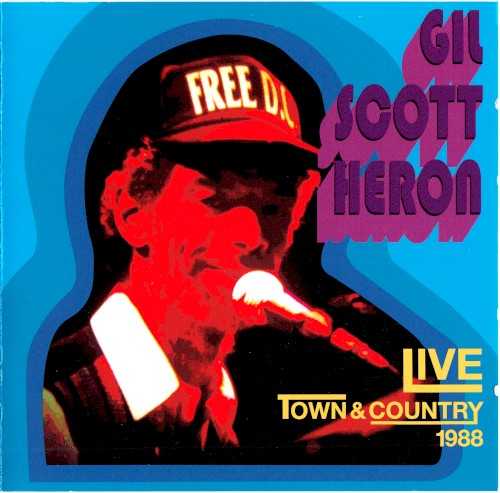 | Album: 24 of 30 Title: Live at the Town & Country 1988 Released: 2008 Tracks: 11 Duration: 1:52:45 Scroll: Up Down Top Bottom 25% 50% 75% AlbumCover | 1 Black Man And Monster Movies (06:36) 2 Space Song (05:57) 3 We Almost Lost Detroit (04:17) 4 Home Is Where the Hatred Is (11:21) 5 Save the Children (09:18) 6 The Vibemasphere (12:43) 7 Angel Dust (13:22) 1 The Blackground (13:48) 2 Winter In America (09:18) 3 The Spirit (12:43) 4 Johannesburg (13:22) |
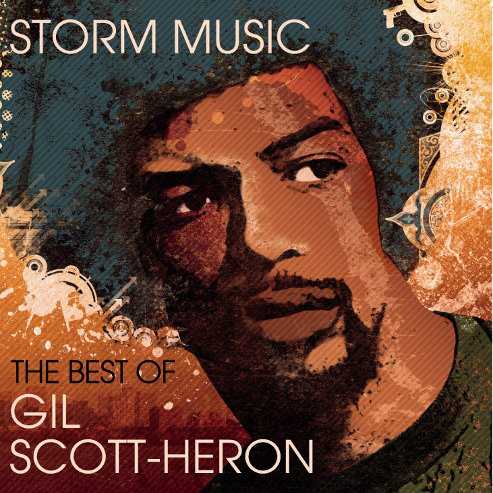 | Album: 25 of 30 Title: Storm Music: The best of Released: 2009 Tracks: 16 Duration: 1:08:36 Scroll: Up Down Top Bottom 25% 50% 75% Spotify AlbumCover | 1 The Revolution Will not be Televised (early version) (03:23) 2 Is That Jazz? (03:45) 3 Grandmas Hands (05:24) 4 Lady Day and John Coltrane (03:36) 5 Pieces Of A Man (04:54) 6 Or Down You Fall (03:13) 7 Get Out of the Ghetto Blues (04:02) 8 When You Are Who You Are (03:22) 9 Inner City Blues (Make Me Wanna Holler) (05:50) 10 Storm Music (05:02) 11 Free Will (03:32) 12 The Vulture (04:33) 13 I Think Ill Call it Morning (03:31) 14 The Needles Eye (04:49) 15 A Sign of the Ages (05:05) 16 Save the Children (04:27) |
![Allmusic album Review : I’m New Here is a shock. It’s a wallop filled with big nasty beats, a wide range of sonic atmospheres, and more -- sometimes unintentional -- autobiographical intimacy than we’ve heard from Gil Scott-Heron than ever before. Produced by XL Recordings head Richard Russell, I’m New Here is his first record in 16 years. It is a scant 28 minutes and doesn’t need to be a second longer. Its unlike anything he’s previously recorded, though there is metaphoric precedence in his earliest, largely spoken word albums. Its production pushes forcefully at the margins, and Scott-Heron embraces it without a hint of nostalgia. It opens with “On Coming from a Broken Home,” the first of a two-part poem that bookends the album. Over a piano and a sampled string loop (from Kanye Wests “Flashing Lights”), he reflects on his upbringing filled with strong female figures and an unconventional structure, with a startling epiphany at the end. It segues immediately into a slamming read of Robert Johnsons “Me and the Devil,” with enormous hip-hop drums, sampled strings, and sonic effects that create a sense of brooding menace as Scott-Heron wails with bracing rawness to hair-raising effect. Just as quickly, the album shifts dramatically. A lone acoustic guitar introduces the Bill Callahan-penned title track. Scott-Heron recites the verse but sings its refrain: “No matter how far wrong gone/You can always turn around.” It feels like he’s speaking into a mirror with a dawning awareness of who -- and what -- hes become as he accepts it. He now owns this song. A Burial-like wall of effects over a cello loop introduces “Your Soul and Mine.” It’s Scott-Herons unflinching look at death, and the way it feeds, yet ends with a warrior’s words: "So if you see the vulture coming/Flying circles in your mind/Remember there is no escaping/For he will follow close behind/Only promise me a battle/For your soul, and mine." It’s not all darkness, however. A reading of Bobby "Blue" Blands “I’ll Take Care of You,” features Gils soulful piano with a small string section. He sings it tenderly, in a now-raspier but still deeply expressive voice; it stands out sonically, but belongs here because of its intimacy. “New York Is Killing Me,” based on a John Lee Hooker blues, has been reinvented with almost entirely new lyrics and arrangement. Singers from the Harlem Gospel Choir; handclaps, bass drums, cymbals, synths, and guitar are treated spatially by Russell; Scott-Herons lead vocal roars from the center. “The Crutch” is a burning atmospheric poem about a junkie’s life. Scott-Heron doesn’t distance himself from his subject; it isn’t mere observation, but an empathic elegy, and Russell’s suffocatingly close production brings it home. Forty years after his debut, I’m New Here contains the artful immediacy that distinguishes Scott-Heron’s best art. The modern production adds immeasurably to that quality, underscores his continued relevance in reflecting the times, and opens his work to a new generation of listeners while giving older ones a righteous jolt. [XL is also offering a limited editon of 300 copies with seven bonus tracks. These include unreleased material from the albums sessions, as well as new versions of "Winter In America" and "Home Is Where The Hatred Is."] im_new_here](../../images/gil_scott_heron-im_new_here.jpg) | Album: 26 of 30 Title: I’m New Here Released: 2010-02-08 Tracks: 22 Duration: 50:19 Scroll: Up Down Top Bottom 25% 50% 75% Spotify TrackSamples Wikipedia Allmusic AlbumCover | 1 On Coming From a Broken Home, Part 1 (02:20) 2 Me and the Devil (03:33) 3 I’m New Here (03:33) 4 Your Soul and Mine (02:02) 5 Parents (interlude) (00:18) 6 I’ll Take Care of You (02:58) 7 Being Blessed (interlude) (00:12) 8 Where Did the Night Go (01:14) 9 I Was Guided (interlude) (00:14) 10 New York Is Killing Me (04:29) 11 Certain Things (interlude) (00:08) 12 Running (02:00) 13 The Crutch (02:44) 14 I’ve Been Me (interlude) (00:16) 15 On Coming From a Broken Home, Part 2 (02:15) 1 Piano Player (intro) (00:24) 2 Home Is Where the Hatred Is (live studio version) (03:19) 3 Winter in America (live studio version) (05:32) 4 Jazz (interlude) (03:24) 5 Is That Jazz (04:34) 6 A Place to Go (interlude) (00:48) 7 My Cloud (03:54) |
| I’m New Here : Allmusic album Review : I’m New Here is a shock. It’s a wallop filled with big nasty beats, a wide range of sonic atmospheres, and more -- sometimes unintentional -- autobiographical intimacy than we’ve heard from Gil Scott-Heron than ever before. Produced by XL Recordings head Richard Russell, I’m New Here is his first record in 16 years. It is a scant 28 minutes and doesn’t need to be a second longer. Its unlike anything he’s previously recorded, though there is metaphoric precedence in his earliest, largely spoken word albums. Its production pushes forcefully at the margins, and Scott-Heron embraces it without a hint of nostalgia. It opens with “On Coming from a Broken Home,” the first of a two-part poem that bookends the album. Over a piano and a sampled string loop (from Kanye Wests “Flashing Lights”), he reflects on his upbringing filled with strong female figures and an unconventional structure, with a startling epiphany at the end. It segues immediately into a slamming read of Robert Johnsons “Me and the Devil,” with enormous hip-hop drums, sampled strings, and sonic effects that create a sense of brooding menace as Scott-Heron wails with bracing rawness to hair-raising effect. Just as quickly, the album shifts dramatically. A lone acoustic guitar introduces the Bill Callahan-penned title track. Scott-Heron recites the verse but sings its refrain: “No matter how far wrong gone/You can always turn around.” It feels like he’s speaking into a mirror with a dawning awareness of who -- and what -- hes become as he accepts it. He now owns this song. A Burial-like wall of effects over a cello loop introduces “Your Soul and Mine.” It’s Scott-Herons unflinching look at death, and the way it feeds, yet ends with a warrior’s words: "So if you see the vulture coming/Flying circles in your mind/Remember there is no escaping/For he will follow close behind/Only promise me a battle/For your soul, and mine." It’s not all darkness, however. A reading of Bobby "Blue" Blands “I’ll Take Care of You,” features Gils soulful piano with a small string section. He sings it tenderly, in a now-raspier but still deeply expressive voice; it stands out sonically, but belongs here because of its intimacy. “New York Is Killing Me,” based on a John Lee Hooker blues, has been reinvented with almost entirely new lyrics and arrangement. Singers from the Harlem Gospel Choir; handclaps, bass drums, cymbals, synths, and guitar are treated spatially by Russell; Scott-Herons lead vocal roars from the center. “The Crutch” is a burning atmospheric poem about a junkie’s life. Scott-Heron doesn’t distance himself from his subject; it isn’t mere observation, but an empathic elegy, and Russell’s suffocatingly close production brings it home. Forty years after his debut, I’m New Here contains the artful immediacy that distinguishes Scott-Heron’s best art. The modern production adds immeasurably to that quality, underscores his continued relevance in reflecting the times, and opens his work to a new generation of listeners while giving older ones a righteous jolt. [XL is also offering a limited editon of 300 copies with seven bonus tracks. These include unreleased material from the albums sessions, as well as new versions of "Winter In America" and "Home Is Where The Hatred Is."] | ||
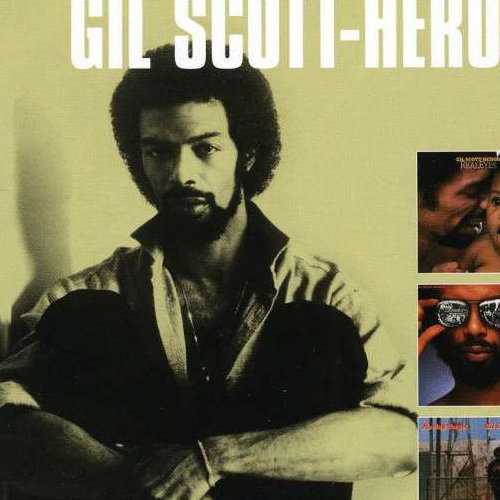 | Album: 27 of 30 Title: Original Album Classics Released: 2011-01-24 Tracks: 22 Duration: 1:53:44 Scroll: Up Down Top Bottom 25% 50% 75% Allmusic AlbumCover | 1 The Train From Washington (04:47) 2 Not Needed (03:56) 3 Waiting for the Axe to Fall (04:48) 4 Combinations (03:40) 5 A Legend in His Own Mind (03:41) 6 You Could Be My Brother (06:22) 7 The Klan (04:49) 8 Your Daddy Loves You (For Gia Louise) (03:16) 1 Storm Music (04:54) 2 Grandmas Hands (05:24) 3 Is That Jazz? (03:46) 4 Morning Thoughts (04:41) 5 Inner City Blues (Poem: The Siege of New Orleans) (05:50) 6 Gun (04:02) 7 B Movie (12:12) 1 Fast Lane (04:54) 2 Washington, D.C. (04:20) 3 No Exit (04:05) 4 Blue Collar (05:45) 5 Explanations (04:12) 6 Ready or Not (04:33) 7 Black History / The World (09:41) |
 | Album: 28 of 30 Title: We’re New Here Released: 2011-02-21 Tracks: 26 Duration: 1:11:31 Scroll: Up Down Top Bottom 25% 50% 75% Spotify Wikipedia Allmusic AlbumCover | 1 Im New Here (03:27) 2 Home (03:11) 3 Ive Been Me (interlude) (00:28) 4 Running (03:32) 5 My Cloud (04:27) 6 Certain Things (interlude) (00:10) 7 The Crutch (03:10) 8 Ur Soul and Mine (04:18) 9 Parents (interlude) (00:29) 10 Piano Player (01:16) 11 NY Is Killing Me (05:44) 12 Jazz (interlude) (00:50) 13 Ill Take Care of U (04:43) 1 Im New Here (03:27) 2 Home (03:11) 3 Ive Been Me (interlude) (00:28) 4 Running (03:32) 5 My Cloud (04:27) 6 Certain Things (interlude) (00:10) 7 The Crutch (03:10) 8 Ur Soul and Mine (04:18) 9 Parents (interlude) (00:29) 10 Piano Player (01:16) 11 NY Is Killing Me (05:44) 12 Jazz (interlude) (00:50) 13 Ill Take Care of U (04:43) |
| We’re New Here : Allmusic album Review : Gil Scott-Heron proved he still had it on 2010s Im New Here, his first album in 16 years. Simultaneously, Jamie Smith (aka Jamie xx) established himself as a sonic architect on his bands moody, minimal debut, then as a producer remixing other artists and DJing in clubs across the U.K. This pair comes together on Were New Here, the remix of Scott-Herons album. It is structured in similar fashion to its predecessor: 13 tracks with songs broken by four brief interludes; the set is rhythm-heavy and suffocatingly close, but not a track-for-track take. Richard Russells production on Im New Here kept Scott-Herons voice front and center; Smith displaces it often, all but covering it with effects, beats, and pitched vocals in styles that cross the electronic music gamut from house to electro to dubstep. "Im New Here" begins skeletally; Scott-Heron recites solo before a keyboard shimmers in. Gloria Gaynors "Casanova Brown" in chipmunk pitch is sampled in just under a dread dub bassline and a skittering rhythm track with squiggly keyboard sounds before Scott-Heron counters -- its delightfully unsettling. The strange, outer space sound library effects on "Home" accompany Scott-Heron singing "home is where the hatred is..." amid a clipped, heavily reverbed, and euphoric keyboard sample that repeats just over a drum loop; it adds gloss without altering the darkness. "Running" has his spoken poetry coming from just around the corner and through a tunnel. Its juxtaposed against a full-blown post-Dilla hip-hop rhythm. On "Ur Soul and Mine," a house rhythm leads the charge and Scott-Herons vocal moves right into a blanket of synths. "The Crutch," with its layers of high-pitched, blissed-out female backing vocals atop frenetic drumnbass, is a rhythm collision. In "My Cloud," with its lilting tempo and slippery bass drum, a shimmering bassline and watery Rhodes piano provide the backing for the sweetest soul vocal Scott-Heron has ever cut. Smith even evokes the sound of his own band in the closer, "Ill Take Care of U," with his sparse guitar line, as pianos and basslines pulse under sets of squelchy synth chords. Were New Here is a mercurial collaboration; its full of nods to other club styles and eras, but Smiths expansive direction is his own. He accomplishes a difficult task in successfully (re)presenting Scott-Herons music -- integrity intact -- in the present tense to a fickle yet discerning groove-centric culture without kitsch or excess. | ||
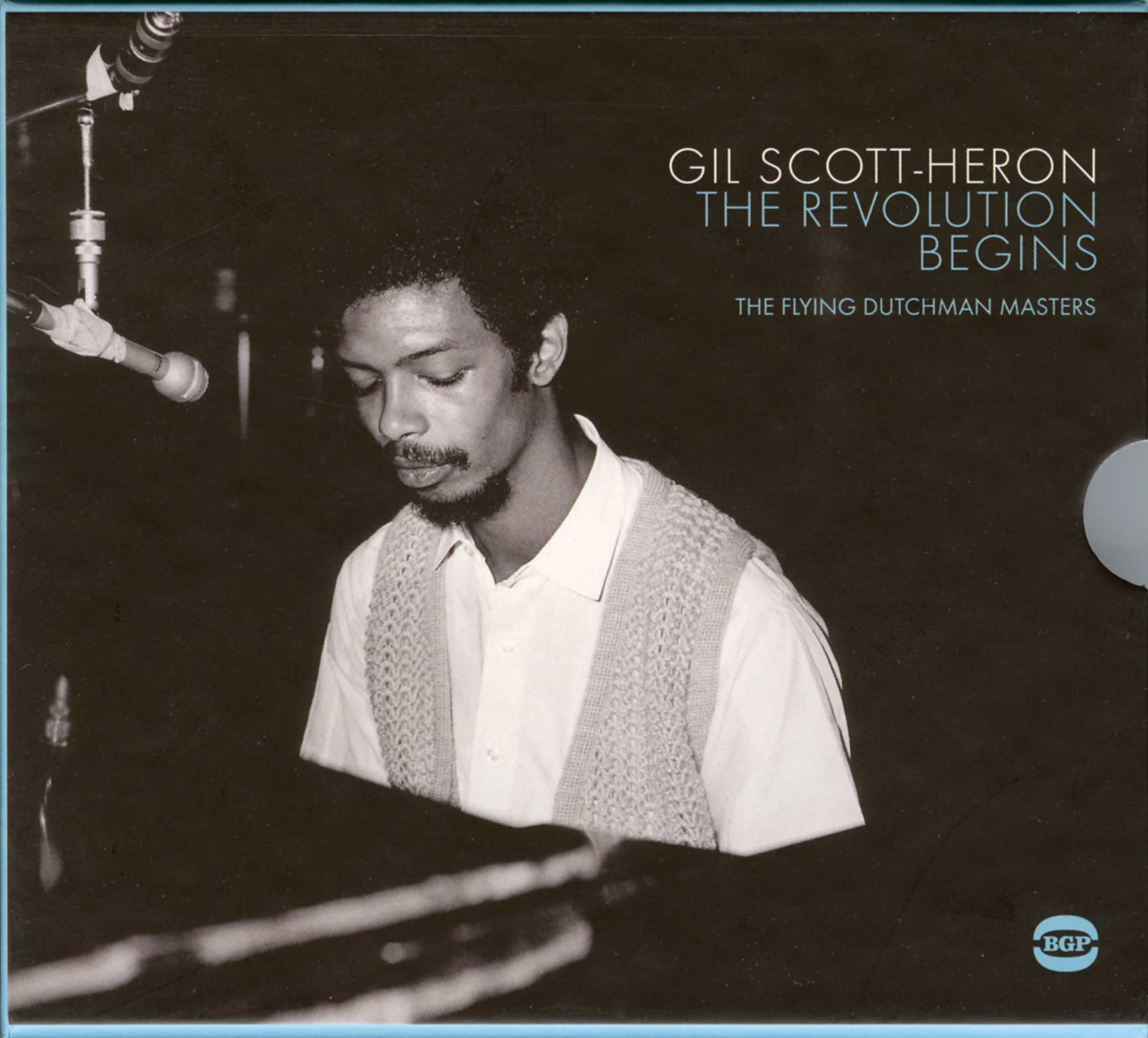 | Album: 29 of 30 Title: The Revolution Begins: The Flying Dutchman Masters Released: 2012 Tracks: 51 Duration: 2:49:04 Scroll: Up Down Top Bottom 25% 50% 75% Spotify AlbumCover | 1 Lady Day and John Coltrane (03:34) 2 Home Is Where the Hatred Is (03:21) 3 Save the Children (04:27) 4 The Revolution Will Not Be Televised (03:07) 5 Did You Hear What They Said? (03:30) 6 Pieces of a Man (04:54) 7 Speed Kills (03:18) 8 Everyday (04:30) 9 I Think I’ll Call It Morning (03:31) 10 When You Are Who You Are (03:23) 11 Free Will (03:42) 12 Or Down You Fall (03:13) 13 The Needle’s Eye (04:51) 14 The Middle of Your Day (04:32) 15 A Sign of the Ages (04:03) 16 Wholl Pay Reparations on My Soul? (05:15) 1 Introduction / The Revolution Will Not Be Televised (03:21) 2 Whitey on the Moon (01:59) 3 No Knock (02:12) 4 Small Talk at 125th & Lenox (01:21) 5 Billy Green Is Dead (01:30) 6 Sex Education: Ghetto Style (00:51) 7 The Vulture (04:32) 8 The Prisoner (09:25) 9 ...and Then He Wrote Meditations (03:14) 10 Plastic Pattern People (02:53) 11 The Get Out of the Ghetto Blues (05:09) 12 Artificialness (03:07) 13 Aint No New Thing (04:33) 14 Brother (02:35) 15 Evolution (And Flashback) (03:21) 16 The King Alfred Plan (02:47) 17 Enough (04:16) 18 Paint It Black (00:33) 19 Omen (01:46) 20 Wiggy (01:37) 21 Comment #1 (04:27) 22 The Subject Was Faggots (03:11) 1 Did You Hear What They Said? (alt take 1) (03:31) 2 The Middle of Your Day (alt take 1) (04:41) 3 Free Will (alt take 1) (02:57) 4 The Get Out of the Ghetto Blues (alt ending) (05:06) 5 Speed Kills (alt take 3) (03:19) 6 The King Alfred Plan (alt take) (03:01) 7 No Knock (alt take) (02:04) 8 Wiggy (alt take) (01:32) 9 Aint No New Thing (breakdown take) (02:39) 10 Billy Green Is Dead (alt take) (01:33) 11 ... And Then He Wrote Meditations (alt take) (01:31) 12 No Knock (breakdown alt take) (02:09) 13 Free Will (alt take 2) (02:49) |
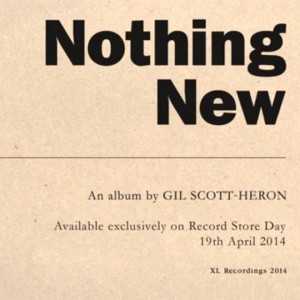 | Album: 30 of 30 Title: Nothing New Released: 2014-04-19 Tracks: 14 Duration: 32:21 Scroll: Up Down Top Bottom 25% 50% 75% Spotify Allmusic AlbumCover | 1 Did You Hear What They Said (04:06) 2 Better Days Ahead (04:34) 3 Household Name (interlude) (00:12) 4 Your Daddy Loves You (04:03) 5 Changing Yourself (interlude) (00:11) 6 Pieces of a Man (04:32) 7 Enjoying Yourself (outro) (00:19) 8 Alien (Hold on to Your Dreams) (03:04) 9 Before I Hit the Bottom (interlude) (00:21) 10 95 South (All the Places We’ve Been) (03:10) 11 The Other Side (03:03) 12 The On/Off Switch (interlude) (00:26) 13 Blue Collar (03:51) 14 On Bobby Blue Bland (outro) (00:29) |